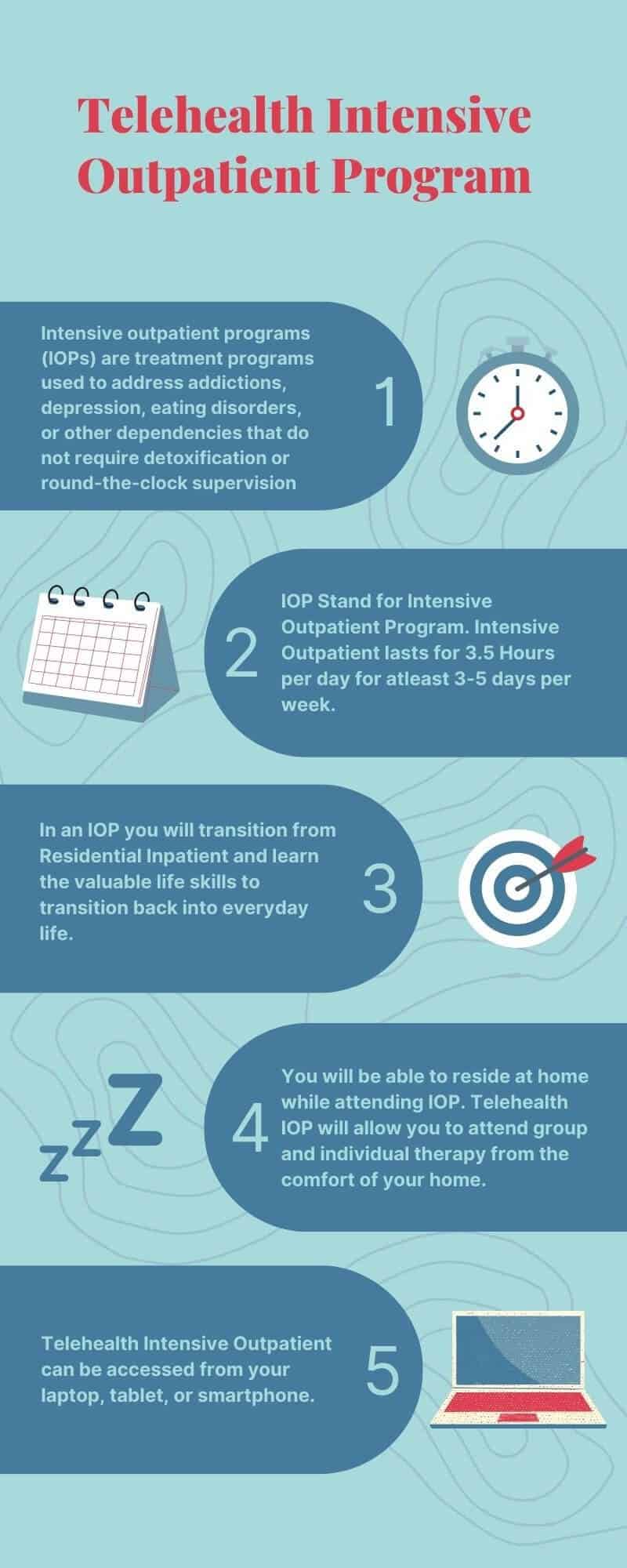Checking Out the Function of Nutrition and Workout in Enhancing the Performance of an Extensive Outpatient Program
In the realm of intensive outpatient programs (IOPs), the junction of nourishment and exercise often stands as an encouraging yet underexplored method for enhancing restorative end results. The prospective harmonies between customized nutrition plans, physical activity regimens, and traditional IOP treatments present an engaging proposition.
Benefits of Nutrition in IOP
In Extensive Outpatient Programs (IOP), integrating a well-balanced nutrition strategy plays a crucial role in supporting individuals' overall wellness and healing trip. Correct nourishment is fundamental in advertising physical and mental well-being during the therapy procedure. By focusing on nutrient-dense foods, individuals in IOP can boost their power levels, concentration, and mood security, which are important for efficient therapy involvement and overall recuperation development.
Nutrition plays a significant role in stabilizing blood sugar levels, which can aid lower food cravings and keep emotional balance. Generally, the benefits of focusing on nourishment in IOP are clear: improved physical wellness, boosted psychological wellness, and boosted resilience in the face of challenges throughout the recovery trip.
Impact of Exercise on Treatment
With a structure of prioritizing nourishment established within extensive outpatient programs, the unification of exercise further boosts the comprehensive approach to sustaining people' overall wellness and recovery trip. Exercise plays a critical duty in psychological health and wellness therapy by promoting overall well-being and helping in the monitoring of various psychological health problems. When workout is incorporated right into intensive outpatient programs (IOPs), it enhances the benefits of nutritional interventions, causing enhanced treatment end results.
Normal workout has been revealed to minimize signs of stress and anxiety, clinical depression, and anxiety, which are common concerns for individuals in extensive outpatient therapy - Intensive Outpatient Program (IOP). Engaging in physical task launches endorphins, neurotransmitters that help ease discomfort and induce sensations of enjoyment, as a result boosting mood and lowering adverse emotions. Additionally, exercise can improve cognitive function, boost rest quality, and increase self-esteem, all of which are vital components in the recovery process.
Integrating Healthy Consuming Behaviors
Advertising a balanced diet plan is essential for individuals going through extensive outpatient programs to support their overall health and recuperation journey properly. Integrating healthy and balanced consuming routines into their daily regimen can dramatically influence their physical and psychological health. In the context of intensive outpatient programs, where people might deal with different difficulties connected to their psychological health and wellness, chemical abuse, or eating disorders, nutrition plays a critical duty in improving treatment outcomes.
A well balanced diet regimen abundant in nutrients like fruits, veggies, whole grains, lean proteins, and healthy and balanced fats can provide the vital fuel required for the body to heal and recover. Moreover, proper nutrition can aid maintain mood, enhance cognitive function, and enhance general power levels, which are crucial for individuals proactively taking part in treatment and various other therapy techniques.

Integrating nutrition education, dish preparation, and keeping an eye on into extensive outpatient programs can empower people to make much healthier food options, develop lasting eating article source habits, and ultimately sustain their lasting recovery objectives. By dealing with the importance of healthy and balanced consuming routines within the context of extensive outpatient programs, doctor can offer a more all natural approach to treatment that deals with both physical and mental well-being.

Exercise Strategies in IOP
Exactly how can exercise be successfully incorporated into extensive outpatient programs to enhance general health and therapy outcomes? Physical task strategies in Intensive Outpatient Programs (IOP) play a critical duty in promoting holistic health and boosting mental wellness outcomes. Including structured exercise routines tailored to specific requirements can significantly improve the performance of IOPs.
One efficient method is to supply a variety of physical tasks to cater to various choices and fitness degrees. Additionally, incorporating physical task breaks throughout the program schedule can aid damage up sedentary periods, boost power degrees, and improve focus throughout therapy sessions.
Moreover, involving qualified fitness teachers or physical specialists in the program can make sure that exercises are secure, reliable, and straightened with participants' treatment goals. Normal monitoring of read review individuals' exercise levels and development is vital to track improvements and make modifications as needed (Intensive Outpatient Program (IOP)). On the whole, incorporating tailored exercise strategies in IOPs can add to far better treatment outcomes and general wellness for people looking for extensive psychological health assistance

Holistic Technique for Better Outcomes
Carrying out an extensive approach that deals with all facets of a person's wellness is crucial for making best use of therapy end results in intensive outpatient programs. A holistic strategy considers the interconnectedness of physical, mental, and psychological wellness, acknowledging that these elements are integral to total wellness. By incorporating holistic practices into extensive outpatient programs, people can experience much more comprehensive and enduring benefits.
Including nourishment and exercise treatments alongside mental health treatments can cause enhanced treatment end results. Nutrition plays an essential function in supporting psychological wellness and total health, offering essential nutrients for cognitive function and emotional regulation. Likewise, regular exercise has actually been shown to enhance state of mind, reduce stress and anxiety, and boost cognitive feature, every one of which are advantageous for people undertaking intensive outpatient treatment.
Final Thought
To conclude, the assimilation directory of nutrition and workout into an intensive outpatient program can significantly enhance its efficiency. By concentrating on healthy and balanced eating behaviors and exercise techniques, people going through treatment can experience enhanced end results. Taking an alternative strategy that resolves both physical and mental wellness is essential for advertising general health and healing in IOP setups.